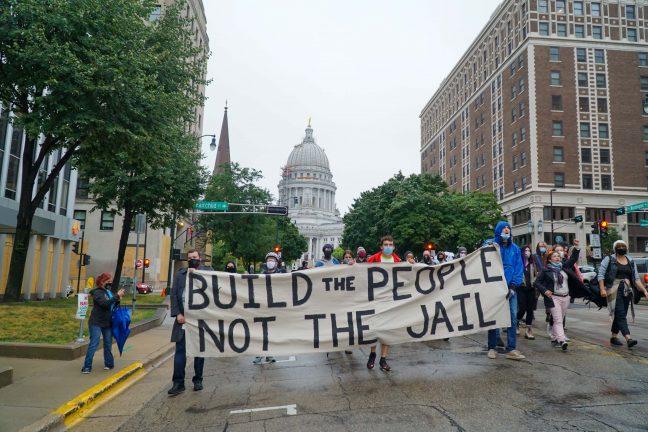Only 7% of Wisconsin’s prisoner population has received at least one COVID-19 vaccine dose despite them being prioritized in Phase 1B of vaccine rollout Jan. 26.
Dane County jail just began vaccinating its 500 inmates April 5 when Wisconsin residents age 16 and older became eligible to receive the vaccine.
As of April 12, 39% of Wisconsin’s general population has received at least one dose of the vaccine, and 25% are fully vaccinated. This disparity is inexcusable, as prisoners are 550% more likely to contract COVID-19 and 300% more likely to die from COVID-19 than the general population.
By limiting vaccinations, government officials are endangering prisoners who have no way to protect themselves from the virus. This offense reflects years of America’s treating prisoners as second-class citizens.
Since COVID-19 started spreading widely in March 2020, experts knew that prisons would be hotspots because of their cramped living conditions and high-contact facilities. Prison outbreaks during the second wave in Wisconsin cities like Oshkosh, Racine and Fox Lake demonstrated how unsafe prisons were prior to a vaccine rollout.
John Hopkins Center for Health Security director Dr. Thomas Ingelsby said prisons are unfit for COVID-19 precautions in an NPR article.
Open COVID-19 vaccine eligibility unproductive, focus must be on currently eligible groups
“All the conditions that we think about in terms of trying to control COVID, they’re all moving in the wrong direction in these facilities,” Ingelsby said in the article. “They are basically the perfect conditions for super-spreading events.”
Prisoner susceptibility to COVID-19 has been obvious for nearly a year and the Wisconsin DHS prioritized vaccinating prisoners in January. But, they have failed to follow these promises. Dane County Jail began vaccinating last week while in contrast, the University of Wisconsin has vaccinated 17,006 students and employees.
Prisoners can only receive the vaccine through local government officials and have no way to access pharmacies where vaccines are widely available. This gives the government full control over whether or not their prisoners can avoid a deadly virus.
The government is also legally required to “provide prisoners with adequate medical care” under the Eighth Amendment as outlined in the ACLU’s National Prison Project.
The amendment requires officials to give easy access to medical care and says a violation of this amendment can be proven with circumstantial evidence showing prison officials disregarding obvious health threats to prisoners.
Low vaccination rates increase the likelihood of prisons violating this amendment in Wisconsin by leaving prisoners prone to contracting the virus.
University will not mandate vaccines, need to explore other ways to incentivize vaccines
Three prisoners and three staff at Kettle Moraine Correctional Institution confirmed to the Wisconsin State Journal that, “cellmates of COVID-19-infected inmates were not separated from other inmates” and one of the prisoners said the employees “left knowingly exposed inmates on the unit with negative cases.”
Even when properly following COVID-19 precautions, jails and prisons create an unsafe environment for inmates that haven’t been vaccinated yet. Dane County Jail had an outbreak in November of 2020 and was only able to isolate infected or contact-traced inmates in solitary confinement. This means the jail used a punishment facility for inmates when they’d done nothing wrong, just contracted a virus the jail was unable to control.
Vaccinating prisoners on a large scale would protect them from the virus and end the terrible conditions they’ve endured for a year in this pandemic. But that would mean ethically treating inmates with respect, a seemingly difficult goal for Wisconsin.
Republican lawmakers have pushed against vaccinating inmates and claim the general population should be the priority despite the higher infection risks in prisons.
Wisconsin, alongside most other U.S. states, also limits voting eligibility for both prisoners and those under probation or supervision after being released, so inmates have less stake in the decisions directly affecting, in this case, their personal health.
As COVID-19 crisis increases wealth gap, WI must reform social welfare programs
While some prisoners are refusing to take the vaccine across the country, this distrust largely comes from the government providing insufficient information to them. Prisoners don’t have access to online sources that show the vaccine’s safety and efficacy.
A PBS article says one inmate at a federal prison in Danbury, Connecticut, “felt nervous about not having any information” about the vaccine, but eventually took it after talking to relatives in the medical field.
The government needs to begin allocating more vaccines to prisons and jails and provide enough information to prisoners to ensure they feel comfortable taking the vaccine. Prisoners are not only at high risk for contracting COVID-19 but are also facing unsafe living conditions.
The ways that prisoners have been treated during this pandemic reflect their historic oppression by the government. Even if they effectively vaccinate prisoners in the coming months, this offense should be a call for broad prison reform in Wisconsin and across the U.S.
Will Romano ([email protected]) is a freshman studying economics and journalism.














